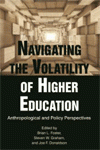
Navigating the Volatility of Higher Education
Anthropological and Policy Perspectives
Edited by:
Brian L. Foster, University of Missouri, Columbia
Steven W. Graham, University of Missouri System
Joe F. Donaldson, University of Missouri-Columbia
A volume in the series: Education Policy in Practice: Critical Cultural Studies. Editor(s): Rodney Hopson, American University. Edmund Hamann, University of Nebraska-Lincoln.
Published 2018
Applied Anthropology provides a new perspective on today’s higher education environment. Volatile and unpredictable forces affect research and instruction across many sectors and levels, and global dynamics are among the strongest drivers of change. Further, within American higher education, daunting complexity and multiple layers of activity weave a rich tapestry of environment, structure, and culture.
This book provides three complementary anthropological perspectives as a framework for analyzing the ground-shifting changes underway in higher education – the higher education mindset, political and policy perspectives, and instruction and learning. These domains intersect with many operational dimensions of higher education – research, health care, athletics, economic development, fiscal management, planning, and faculty roles/challenges – another way of framing the complexity of the situation we are addressing. Book chapters also provide a set of implications for higher education policy. The book concludes with a vision of next steps in research and practice to further anthropology’s contribution to higher education policy and practice.
The intended audience includes both academic and professionals—e.g., faculty and students in departments of higher education, anthropology, and education policy. Higher education leaders, administrators, governing board members, and many others will find the book helpful in providing insight into today’s challenges. The book will also be of use to professionals outside higher education who work on policy issues, on meeting the needs of employers, and on preparing students for careers in public service.
CONTENTS
Preface, Brian L. Foster. PART I: INTRODUCTION. Anthropology of and for Higher Education: Implications for Research, Policy and Practice, Brian L. Foster, Teresa L. McCarty, and Tazin Daniels. PART II: THE HIGHER EDUCATION MINDSET. Today’s Institutions of Higher Learning: Clashing Values in Motion, Steven W. Graham, Joe F. Donaldson, and Michael J. Offerman. Gender Inequality and Managerialism: A Self-Ethnographic Exploration of a Woman Department Chair, Jeni Hart. Domestic and Immigrant Entrepreneurs: A Significant Disparity, Brian L. Foster. PART III: POLITICAL AND POLICY PERSPECTIVES. The Situated University: Political-Cultural Context, Organizational Culture, and Leadership, James H. McDonald. Journey of Creation: A Photoethnographic, Autoethnographic, and Ethnographic Look at Leadership, Culture, and Community in a Young Northern New Mexico College, Florence M. Guido and Alicia Fedelina Chávez. Interdisciplinary Leadership: Communicating for Change within the Academy, Ariane Schauer and Duncan Earle. The End of Higher Education: Assumptions, Implications, and Impacts of Apocalyptic Narratives, Michael Wesch. Saving the University in France, Eli Thorkelson. PART IV: INSTRUCTION AND LEARNING: DELIVERY, EVALUATION AND INNOVATION. The Anthropology of Interdisciplinary Programs in Higher Education, Wayne A. Babchuk and Robert K. Hitchcock. Race and the Production of Knowledge in Black Higher Education: The Legacy and Contributions of Charles H. Thompson and the Journal of Negro Education in Evaluation, Stafford Hood and Rodney Hopson. Makerspaces as an Epistemic Community, Anne Larrivee. PART V: CONCLUSION. Concluding Comments: Beginning To Put the Pieces Together, Brian L. Foster, Don Brenneis, Glen W. Davidson, and Teresa L. McCarty.
-
Paperback978-1-64113-143-8
Web price: $45.04 (Reg. 52.99)
-
Hardcover978-1-64113-144-5
Web price: $80.74 (Reg. 94.99)
- eBook978-1-64113-145-2

- EDU000000 - EDUCATION: General
- EDU034000 - EDUCATION: EDUCATIONAL POLICY & REFORM: General
- EDU015000 - EDUCATION: Higher
-
 Educated for Change?
Muslim Refugee Women in the West
Educated for Change?
Muslim Refugee Women in the West
-
 Learning to Hide
The English Learning Classroom as Sanctuary and Trap
Learning to Hide
The English Learning Classroom as Sanctuary and Trap
-
 Paths to the Future of Higher Education
Paths to the Future of Higher Education
-
 Placing Practitioner Knowledge at the Center of Teacher Education
Rethinking the Policies and Practices of the Education Doctorate
Placing Practitioner Knowledge at the Center of Teacher Education
Rethinking the Policies and Practices of the Education Doctorate
-
 Researching Race in Education
Policy, Practice and Qualitative Research
Researching Race in Education
Policy, Practice and Qualitative Research
-
 Revisiting Education in the New Latino Diaspora
Revisiting Education in the New Latino Diaspora
-
 The Construction, Negotiation, and Representation of Immigrant Student Identities in South African schools
The Construction, Negotiation, and Representation of Immigrant Student Identities in South African schools

